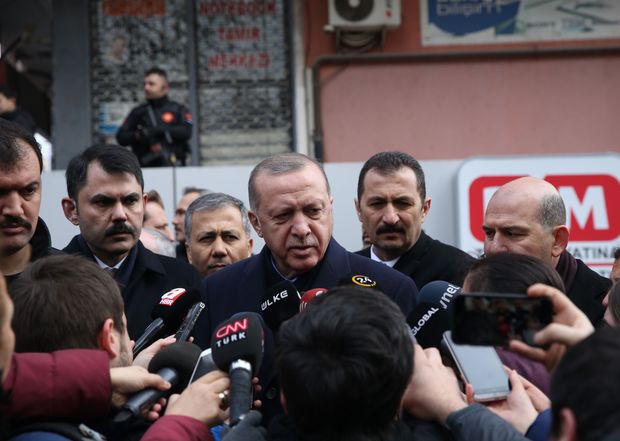Turkish president Recep Tayyip Erdogan takes questions after visiting people injured in the collapse of an apartment building in Istanbul on Feb. 9, 2019. -/AFP/GETTY IMAGES
Four hostile newspapers are more to be feared than a thousand bayonets, Napoleon is claimed to have once said. Two hundred years later, strongmen – both real and wannabe – are still awed and threatened by the power of a critical media.
“There is no difference between a terrorist wielding a gun or a bomb and those who offer their pen or position in the service of his aims,” Turkish President Recep Tayyip Erdogan warned back in 2016. A failed coup four months later would provide the perfect pretext for a record-breaking 81 arrested journalists – “the highest number in any one country at any time” according to the Committee to Protect Journalists. Turkey has remained the top jailer of journalists every year since then, and although the numbers have declined to 68 journalists in 2018, this is still equal to Saudi Arabia, Egypt, Iran, Syria, Azerbaijan and Russia combined. China is a distant second at 47. And those figures are just for the people in prison. There are more outside who are caught up in the appeals process, which does not always go well.
Those arrested are stuck in limbo awaiting a formal indictment for weeks, months or even years. Their actual guilt being irrelevant, it is up to the investigators to sift through their entire life until they find enough tenuous evidence – such as Facebook “likes” or holiday bookings – until a formal charge can be drafted.
And while the ones in prison have suffered the most and are deservedly the most visible victims of Turkey’s press crackdown, many more who were luckier still have to deal with arbitrary termination, denial of accreditation or just outright blacklisting. Unemployed and unhireable is not a great fate either.
So, it is understandable why every time a foreign interviewer gets a chance to sit down with Mr. Erdogan, the topic of the journalists comes up. To which Turkey’s strongman counters, “most of those you say are in prison aren’t journalists, most of them are terrorists,” as he did in 2017 when talking with Bloomberg editor-in-chief John Micklethwait. Turkey ensures that good journalism simply isn’t worth it. But, on the flip side, it also ensures bad journalism is celebrated and rewarded. It is unlikely Napoleon was on Mr. Erdogan’s mind when he likened pens to bombs, but there is something else both men have in common: a particular style of authoritarian rule historians call “dictatorship by plebiscite.”
Such civilian dictatorships involve public consultation at each major step along the way toward authoritarianism. Napoleon, for example, started as first consul for 10 years in 1799. A month later, he held a popular vote on a constitution greatly expanding his powers. In 1802, he held another popular vote to become first consul for life, and again in 1804 to become emperor. For anyone unable to fathom why people would vote away their democracy, there is a trick to it. Citizens are asked to vote in shady referendums in which they choose between the noble, paternalistic leader and imminent chaos. Setting up this false choice requires a very delicate control over the narrative. The media must be vocal but subverted, where it appears robust enough to be taken seriously yet compliant enough that it is essentially outsourced PR for the leader.
Turkey doesn’t oppose journalism on principle, but the official narrative comes first. If that narrative can be preserved with good journalism – as sometimes happens when Turkey finds itself on the right side of an event – great! If not, then bad journalism will do.
And for that, there is a very lively media landscape featuring dozens of television channels, newspapers, radio stations and websites. With more than 90 per cent of the media under direct or indirect government influence, there might be very little diversity of content, but there sure is still a lot of it. A reporter who exclusively sticks to stories that make Turkey look good will earn a steady paycheque, and one who rises to the rank of opinion leader will even be very generously compensated. So there was no real contradiction last October when Mr. Erdogan relentlessly pursued Saudi Arabia’s murder of its journalist Jamal Khashoggi in Istanbul. Both men shared a common enemy – Crown Prince Mohammed bin Salman – and it was an opportunity to drive a wedge between the United States and Turkey’s regional rival Saudi Arabia. There was also no contradiction in Arab exiles in Turkeyproducing journalism critical of their governments back home. What seems like regard for press freedom is once again just politics: The journalists are given free rein because they’re critical of regimes Turkey also opposes. But while it is easy to blame this corruption of journalism on one man, ultimately the fault lies on a people who are indifferent to saving it. In Turkish, there is a well-known idiom: “An arm breaks yet remains within the sleeve.” In the end, a journalist is just the person who reveals to the world that the arm is broken. When a society is angrier at the investigators than the issues they are investigating, it doesn’t require a mastermind to reduce journalism to either a crime or a joke.
By Cinar Kiper
Source: Globe & Mail



